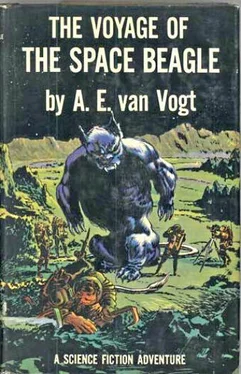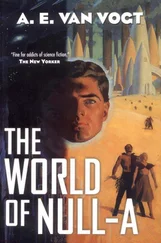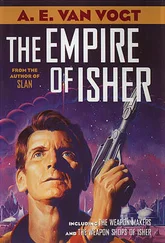Grosvenor said, “I assume the commander is referring to the lack of mechanical aids. But living organisms can have satisfactions that do not require machines: food and drink, association with friends and loved ones. I suggest these bird folk find emotional release in the community thinking and in their method of propagation. Time was when man had little more, yet he called it civilization; and there were great men in those days as well as now.”
“Still,” said physicist von Grossen shrewdly, “you did not hesitate to upset their mode of life.”
Grosvenor was cool. “It is unwise for birds — or men — to live too specialized an existence. I broke down their resistance to new ideas, something which I have not yet been able to do aboard this ship.”
Several men laughed wryly, and the meeting began to break up. Afterwards, Grosvenor saw Morton speak to Yemens, the only man present from the chemistry department. The chemist — second only to Kent now — frowned, and shook his head several times. Finally, he spoke at some length, and he and Morton shook hands.
Morton came over to Grosvenor, and said in a low tone, “The chemistry department will move its equipment out of your rooms within twenty-four hours, on condition that no further reference is made to the incident, Mr Yemens—”
Grosvenor said quickly, “What does Kent think of this?”
Morton hesitated. “He got a whiff of gas,” he said finally, “and will be on his back in bed for several months.”
“But,” said Grosvenor, “that will take us past the date of the election.”
Once more Morton hesitated, then said, “Yes, it will. It means I win the election without opposition, since no one but Kent filed against me.”
Grosvenor was silent, thinking of the potentialities. It was good to know that Morton would continue in office. But what about all the discontented men who had supported Kent?
Before he could speak, Morton went on. “I want to ask this as a personal favour, Mr. Grosvenor. I persuaded Mr. Yemens that it would be unwise to continue Kent’s attack on you. For the sake of peace, I’d like you to keep silent. Make no attempt to exploit your victory. Admit freely that it was a result of the accident, if you are asked, but do not bring up the matter yourself. Will you promise me?”
Grosvenor promised, then said hesitantly, “I wonder if I could make a suggestion.”
“By all means.”
“Why not name Kent your alternative?”
Morton studied him with narrowed eyes. He seemed nonplussed. He said finally, “That’s a suggestion I wouldn’t have expected from you. I’m not, personally, very anxious to boost Kent’s morale.”
“Not Kent’s,” said Grosvenor.
This time Morton was silent. In the end, he said slowly, “I suppose it would release tension.” But he still seemed reluctant.
Grosvenor said, “Your opinion of Kent himself seems to parallel my own.”
Morton laughed grimly. “There are several dozen men aboard whom I would rather see director, but for the sake of peace, I’ll follow your suggestion.”
They parted, Grosvenor with feelings more mixed than he had indicated. It was an unsatisfactory conclusion to Kent’s attack. Grosvenor had the feeling that, in getting the chemistry department out of his rooms, he had won a skirmish and not a battle. Nevertheless, from his own point of view, it was the best solution to what might have been a bitterly fought engagement.
Ixtl sprawled unmoving in the boundless night. Time paced slowly toward the eternity, and space was fathomlessly black. Across the immensity, vague patches of light gleamed coldly at him. Each, he knew, was a galaxy of blazing stars, shrunk by incredible distance to shining swirls of mist. Life was out there, spawning on the myriad planets that wheeled endlessly around their parent suns. In the same way, life had once crawled out of the primeval mud of ancient Glor, before a cosmic explosion destroyed his own mighty race and flung his body out into the intergalactic deeps.
He lived; that was his personal catastrophe. Having survived the cataclysm, his almost unkillable body maintained itself in a gradually weakening state on the light energy that permeated all space and time. His brain pulsed on and on in the same old, old cycle of thought — thinking: one chance in decillions that he would ever again find himself in a galactic system. And then an even more infinitesimal chance that he fall on a planet and find a precious guul.
A billion billion times that thought had pounded to its unvarying conclusion. It was a part of him now. It was like an endless picture unrolling before his mind’s eye. Together with those remote wisps of shiningness out there in that gulf of blackness, it made up the world in which he had his existence. He had almost forgotten the far-flung field of sensitivity his body maintained. In past ages that field had been truly vast, but now that his powers were waning, no signals came to him beyond the range of a few light-years.
He expected nothing, and so the first stimulus from the ship scarcely more than touched him. Energy, hardness — matter! The vague sense perception fumbled into his dulled brain. It brought a living pain, like a disused muscle briefly, agonizingly forced into action.
The pain went away. The thought faded. His brain slid back into its sleep of ages. He lived again in the old world of hopelessness and shining light splotches in a black space. The very idea of energy and matter became a dream that receded. A remote corner of his mind, somehow more alert, watched it go, watched the shadows of forgetfulness reach out with their enveloping folds of mist, striving to engulf the dim consciousness that had flashed into such an anguish of ephemeral existence.
And then once more, stronger, sharper, the message flashed from a remote frontier of his field. His elongated body convulsed in senseless movement. His four arms lashed out, his four legs jackknifed with blind, unreasoning strength. That was his muscular reaction.
His dazed, staring eyes refocused. His stultified vision was galvanized into life. The part of his nervous system that controlled the field took its first unbalancing action. In a flash of tremendous effort, he withdrew it from the billions of cubic miles from which no signals had come, and concentrated its forces in an attempt to pinpoint the area of greatest stimulation.
Even as he fought to locate it, it moved a vast distance. For the first time, then, he thought of it as a ship flying from one galaxy to another. He had a moment of awful fear that it would move beyond where he could sense it, and that he would lose contact forever before he could do anything.
He let the field spread out slightly, and felt the shock of impact as once more he received the unmistakable excitation of alien matter and energy. This time he clung to it. What had been his field became a beam of all the energy his weakened body could concentrate.
Along the tightly held beam, he drew tremendous bolts of power from the ship. There was more energy — by many millions of times — than he could handle. He had to deflect it from himself, had to discharge it into the darkness and the distance. But, like some monstrous leech, he reached out four, five, ten light years, and drained the great ship of its drive power.
After countless aeons of eking out his existence on fragile darts of light energy, he did not even dare to try to handle the colossal power. The vastness of space absorbed the flow as if it had never been. What he did let himself receive shocked the life back into his body. With a savage intensity, he realized the extent of the opportunity. Frantically, he adjusted his atomic structure and drove himself along the beam.
Читать дальше











